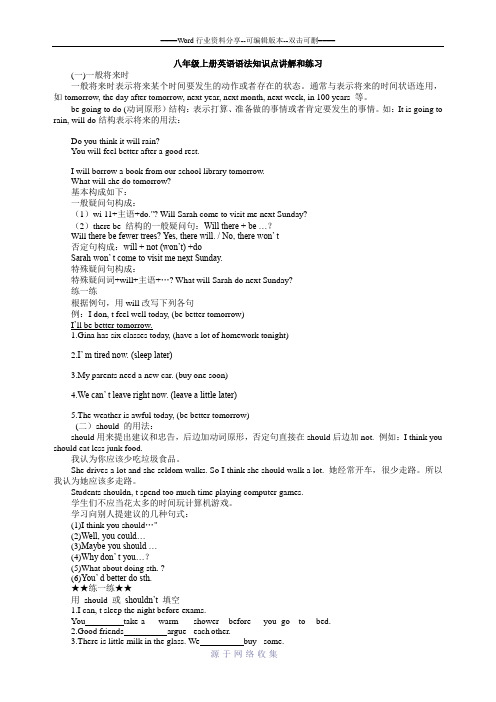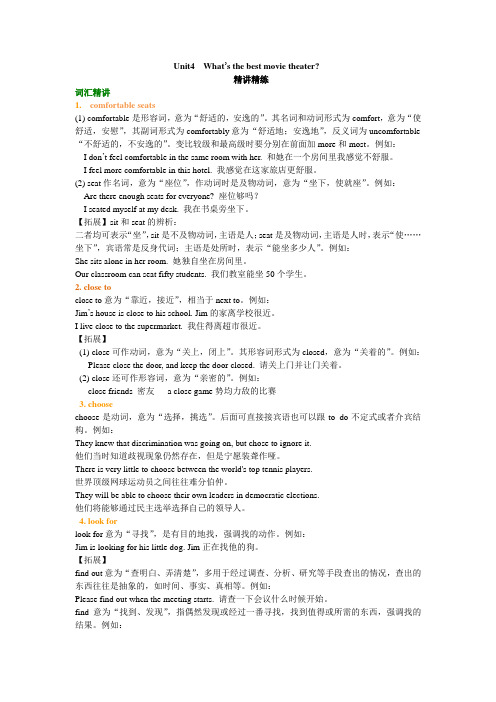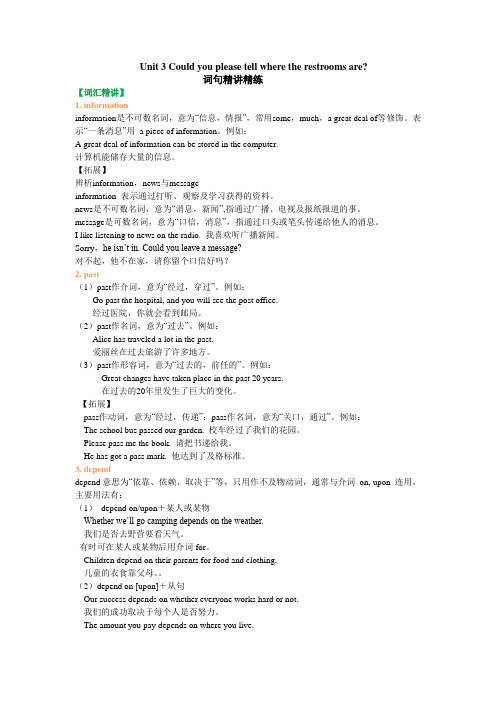初中英语基础知识练习题知识讲解
八年级上册英语语法知识点讲解和练习(学生用)

八年级上册英语语法知识点讲解和练习(一)一般将来时一般将来时表示将来某个时间要发生的动作或者存在的状态。
通常与表示将来的时间状语连用,如tomorrow, the day after tomorrow, next year, next month, next week, in 100 years 等。
be going to do (动词原形)结构:表示打算、准备做的事情或者肯定要发生的事情。
如:It is going to rain, will do结构表示将来的用法:Do you think it will rain?You will feel better after a good rest.I will borrow a book from our school library tomorrow.What will she do tomorrow?基本构成如下:一般疑问句构成:(1)wi 11+主语+do."? Will Sarah come to visit me next Sunday?(2)there be 结构的一般疑问句:Will there + be …?Will there be fewer trees? Yes, there will. / No, there won’ t否定句构成:will + not (won’t) +doSarah won’ t come to visit me next Sunday.特殊疑问句构成:特殊疑问词+will+主语+…? What will Sarah do next Sunday?练一练根据例句,用will改写下列各句例:I don, t feel well today, (be better tomorrow)I’ll be better tomorrow.1.Gina has six classes today, (have a lot of homework tonight)2.I’ m tired now. (sleep later)3.My parents need a new car. (buy one soon)4.We can’ t leave right now. (leave a little later)5.The weather is awful today, (be better tomorrow)(二)should 的用法:should用来提出建议和忠告,后边加动词原形,否定句直接在should后边加not. 例如:I think you should eat less junk food.我认为你应该少吃垃圾食品。
初中英语人教版八上Unit1知识点及练习题

初中英语⼈教版⼋上Unit1知识点及练习题教学主题:(⼈教版)8AU1Section B:Where did you go on vacation?教学重难点:1.课⽂讲解;2.基础题练习教学过程:1.导⼊Monday, July 1sthI arrived in Penang in Malaysia this morning with my family. It was sunny and hot, so we decided to go to the beach near our hotel. My sister and I tried paragliding,. I felt like I was a bird. It was so exciting! For lunch, we had something very special-Malaysian yellow noodles. They were delicious! In the afternoon, we rode bicycles to Georgetown. There are a lot of new buildings now, but many of the old buildings are still there. In Weld Quay, a really old place in Georgetown, we saw the houses of the Chinese traders from 100 years ago. I wonder what life was like here in the past. I really enjoyed walking around the townTuesday, July l6thWhat a difference a day makes! My father and I decided to go to Penang Hill today. We wanted to walk up to the top, but then it started raining a little so we decided to take the train. We waited over an hour for the train because there were too many people. When we got to the top, it was raining really hard. We didn’t have an umbrella so we were wet and cold. It was terrible! And because of the bad weather, we couldn’t see anything below. My father didn’t bring enough money, so we only had one bowl of rice and some fish. The food tasted great because I was so hungry!2.呈现1.activity n.活动。
初中三年英语全部知识点总结及练习版,含答案

初一年级(上)【知识梳理】I. 重点短语1. Sit down 坐下2. on duty 值日3. in English 用英语4. have a seat 请坐5. at home 在家6. look like 看起来像7. look at 看着8. have a look 看看9. come on 加油10. at work 上班11. at school 在学校12. put on 穿上13. look after 照顾14. get up 起床15. go shopping 购物II. 重要句型1. help sb. do sth.2. What about…?3. Let’s do sth.4. It’s time to do sth.5. It’s time for …6. What’s…? It is…/ It’s…7. Where is…? It’s….8. How old are you? I’m….9. What class are you in? I’m in….10. Welcome to….11. What’s …plus…? It’s….12. I think…13. Who’s this? This is….14. What can you see?I can see….15. There is (are) ….16. What colour is it (are they)? It’s (They’re)…17. Whose …is this? It’s….18. What time is it? It’s….III. 交际用语1. Good morning, Miss/Mr….2. Hello! Hi!3. Nice to meet you. Nice to meet you, too.4. How are you? I’m fine, thank you/thanks. And you?5. See you. See you later.6. Thank you! You’re welcome.7. Goodbye! Bye!8. What’s your name? My name is ….9. Here you are. This way, please.10. Who’s on duty today?11. Let’s do.12. Let me see.IV. 重要语法1. 动词be的用法;2. 人称代词和物主代词的用法;3. 名词的单复数和所有格的用法;4. 冠词的基本用法;5. There be句型的用法。
初中英语语法讲解与练习【数-词】

初中英语语法讲解与练习【数-词】数词数词英语数词表示数目或者顺序,可分为基数词和序数词。
基数词表示数量,序数词表示顺序。
知识梳理:提纲挈领,抓住重点和难点!一、基数词的构成1.1-12的基数词是独立的单词,即:one,two,three,four,five,six,seven,eight,nine,ten,eleven,twelve。
2.13-19的基数词以-teen结尾。
如:fourteen,seventeen等,但13,15,18较特殊,13-thirteen 15-fifteen 18-eighteen。
3.20-90的整十位均以-ty结尾。
如:sixty,ninety,但20,30,40,50,80较特殊,20-twenty 30-thirty 40-forty 50-fifty 80-eighty。
4.十位数与个位数之间要加连字符号"-",如:28-twenty-eight,96-ninety-six。
为序数词时,有特别之处。
1.one--- first, two --- second, three --- third, five --- fifth, nice --- ninth, twelve --- twelfth2. 以ty 结尾的单词,要先变y为I, 在加-eth. 例如:thirty ---thirtieth, fifty ---fiftieth3. 以one, two, three 等结尾的多位数词,要将各位数变成序数词。
例如:twenty-one --- twenty-first, one hundred and one --- one hundred and first注意:序数词前常用定冠词,有时还可以用不定冠词a/an 则表示"又一"的意思。
例如:Mr Brown has a second car. 布朗先生另外还有一辆车。
人教版初中英语初二上册Unit 4知识讲解与练习

Unit4 What’s the best movie theater?精讲精练词汇精讲fortable seats(1) comfortable是形容词,意为“舒适的,安逸的”。
其名词和动词形式为comfort,意为“使舒适,安慰”,其副词形式为comfortably意为“舒适地;安逸地”,反义词为uncomfortable “不舒适的,不安逸的”。
变比较级和最高级时要分别在前面加more和most。
例如:I don’t feel comfortable in the same room with her. 和她在一个房间里我感觉不舒服。
I feel more comfortable in this hotel. 我感觉在这家旅店更舒服。
(2) seat作名词,意为“座位”,作动词时是及物动词,意为“坐下,使就座”。
例如:Are there enough seats for everyone? 座位够吗?I seated myself at my desk. 我在书桌旁坐下。
【拓展】sit和seat的辨析:二者均可表示“坐”,sit是不及物动词,主语是人;seat是及物动词,主语是人时,表示“使……坐下”,宾语常是反身代词;主语是处所时,表示“能坐多少人”。
例如:She sits alone in her room. 她独自坐在房间里。
Our classroom can seat fifty students. 我们教室能坐50个学生。
2. close toclose to意为“靠近,接近”,相当于next to。
例如:Jim’s house is close to his school. Jim的家离学校很近。
I live close to the supermarket. 我住得离超市很近。
【拓展】(1) close可作动词,意为“关上,闭上”。
其形容词形式为closed,意为“关着的”。
初中英语人教版七年级下册DO you like pandas 知识讲解 练习

七年级(下)Unit 5 Why do you like pandas?一、重点、难点1.interesting 和interested 的用法区别两个都是形容词,“有趣的”,但是二者之间存在不同之处。
①interesting “使人感兴趣的”,指本身引起人们对某事物的兴趣。
所修饰或者说明的对象为事物,而不是人物。
Panda is a kind of interesting animal.熊猫是一种有趣的动物。
The movie is very interesting.这部电影非常有趣。
②interested 表示对某事物的兴趣。
主语为人,通常与in 连用,即be interested in …对……感兴趣He is interested in math.他对数学感兴趣。
【注意】有类似用法的词还有:relaxed------relaxing 放松的excited----exciting激动的2.Why don’t you want to see them? 你为什么想去看他们?①why 为疑问副词,一般由why引导的特殊疑问句表示询问做某事情的原因,需要用because引导的原因状语从句来回答。
其句型: Why + 一般疑问句?---- Why do you want to see the pandas?---- Because they are cute.②want 表示“想要,想”,(= would like )其用法want sth. 想要某物want to do sth. 想要做某事want sb. to do sth. 想要某人做某事Do you want to go to the zoo? 你想要去动物园吗?【拓展】Why not do sth. …? = Why don’t you do sth. … ? “你为什么不做某事?”也是用来提建议的句型。
Why not see the dolphins first?= Why don’t you see the dolphins first?= How / What about seeing the dolphins now?3. so conj. 连词,“因此,所以;副词( adv.)那么,如此;代词,这样,那样”…but she’s very shy, so please be quiet.①句子中的so 用作连词,“因此;所以”,连接两个句子,一般后面的句子是前面句子的推论或者结果。
Unit9基础知识讲解与练习人教版七年级英语上册

人教版初中英语七年级上册Unit9基础知识讲解与练习Unit 9 知识讲解 A一.favorite1. favorite adj. “最喜欢的,特别喜欢的”,也写作favourite.Sunday is our favorite day. We can go to the park.2. favorite相当于like...best。
H er favorite fruit is strawberries. = She _______ strawberries _______.Their favorite day is Sunday. = They __________ Sunday _______ .3. favorite n. “最喜欢的人或物”,其复数形式是favorites.These books are my favorites. 这些书是我最喜欢的。
二. science n. 科学,是不可数名词。
当它指理科的一门学科时,是可数名词。
Science is my favorite subject. 科学是我最喜欢的科目。
相关单词:n. scientist 科学家Edison is a great scientist. 爱迪生是位伟大的科学家。
三.subject n.1. 学科;科目____________________ 多少门学科do you learn at school?2. subject n. 主题The subject of the poem is friendship.这首诗的主题是友谊。
3. subject n. 主语I don't know the subject of the sentence. 我不知道这个句子的主语。
四.P. E. n.(=physical education)体育,注意它和运动sport的区别have P.E.=have a P. E.class上体育课;play sports做运动eg:They like P. E. class.他们喜欢体育课。
人教版初中英语初三Unit3知识讲解与练习

Unit 3 Could you please tell where the restrooms are?词句精讲精练【词汇精讲】1. informationinformation是不可数名词,意为“信息,情报”,常用some,much,a great deal of等修饰。
表示“一条消息”用a piece of information。
例如:A great deal of information can be stored in the computer.计算机能储存大量的信息。
【拓展】辨析information,news与messageinformation 表示通过打听、观察及学习获得的资料。
news是不可数名词,意为“消息,新闻”,指通过广播、电视及报纸报道的事。
message是可数名词,意为“口信,消息”,指通过口头或笔头传递给他人的消息。
I like listening to news on the radio. 我喜欢听广播新闻。
Sorry,he isn’t in. Could you leave a message?对不起,他不在家,请你留个口信好吗?2. past(1)past作介词,意为“经过,穿过”。
例如:Go past the hospital, and you will see the post office.经过医院,你就会看到邮局。
(2)past作名词,意为“过去”。
例如:Alice has traveled a lot in the past.爱丽丝在过去旅游了许多地方。
(3)past作形容词,意为“过去的,前任的”。
例如:Great changes have taken place in the past 20 years.在过去的20年里发生了巨大的变化。
【拓展】pass作动词,意为“经过,传递”;pass作名词,意为“关口,通过”。
例如:The school bus passed our garden. 校车经过了我们的花园。
- 1、下载文档前请自行甄别文档内容的完整性,平台不提供额外的编辑、内容补充、找答案等附加服务。
- 2、"仅部分预览"的文档,不可在线预览部分如存在完整性等问题,可反馈申请退款(可完整预览的文档不适用该条件!)。
- 3、如文档侵犯您的权益,请联系客服反馈,我们会尽快为您处理(人工客服工作时间:9:00-18:30)。
一.用be的适当形式填空1.–What’s five and six?-- It __eleven。
2. My clothes ____ on the bed.3. I ___ten years old.4.Ann’s Chinese name ___ Lili.5 I ___American. And she ___Chinese.6 I ____ in Class 1and my sister ___inClass Two.7The boy ___(be) from France.8 -- Who ___that man? --He ____ Tom’sfather.9 What color ___ her pens?--They __yellow.10____(be) you Mr. Black? Who ____(be) these girls?11-- How old ____ (be) your cousin?-- 11 years old.12 How much ____ (be) the broccoli?13 How much ____ (be) these whitepants?14 Ken wants ____(be) a musician.15 I want to ____(be) a great swimmer.16Here ____(be) his family photo.17 Here ____(be) your books.18 There____ (be) lots of carrots in thekitchen19There ____(be) two pictures on the wall.20There ____ (be) some water in the bottle(瓶子).21There ____ (be) an apple in the basket.二.否定句1.Their parents ___ (not like) ice creamfor breakfast.2.Billlikesstrawberries,but Bob____(not).3.She _____ (not have) a computer.4.LucyandLily_____(notlike)oranges.5.Lucy____(notlike)hamburgers.But she ___ (like) French Fries.6.JimandJohn____(notdo)haveabasketball.7.His friends _____ (not like) broccoli.8.He doesn’t _____ (like) apples verymu ch.9.She_____(notdo)herhomeworkin the morning.10.I_____(notcan)playtheguitaratall.11.Thelittleboy_____(notlike)French fries.三.肯定句1.SueWhite_____(have)asmallsportscollection.2.Tomoften___(watch)footballonTV.3 Each of us ____ (have) a backpack.3.We each ____(have) a basketball.4.My sister often ____ (go) to Shanghai.5.I ____ (like) Beijing Opera.6.He ___ (speak) English ____ (good).7.The boys and girls often ____(play) afterschool.8.Mybrotheroften____(have)lunchathome.4.They are good ____ (music).5.Letus_____(ask)themtohaveashow.6.Please ____(call) me at seven.7.Don’t ___(do) that now.9.He usually _____(eat) 3 dishes each meal.六.特殊动词11That ____ (sound) boring.10.She can ____ (play) the violin.11.I___(have)avideotapebutshe___(have) nothing.四.疑问句1.____LiLei___(like)broccolifordinner?2____(do) your sister play chess?3 Do you ____ (has) two pens?4 Do you ____(has) a Music Festival?5___ the man ___(want) that T-shirt?6-- Can you ___(play) the violin?-- Yes, I can.7____(can) Ed come to see me?8Can he ____(speak) English?9.Can I ___(help) you?10What ____she____(eat) for lunch?11.What can I ____(does) for you?12Whatdoyou____(paint)usually?Eggs.五.祈使句1.Let’s _____ (have) some eggs.2.Let’s ____(play) football.3.Let’s ______(watch) TV.1.They want ___ (have) a cat.2I like ____ (tomato).3My brother likes ____ (swim).4Can you help kids with____(sing)5Doyoulike_____(sing)withyourstudents?6 What do you like _____(eat), ice creamor salad?7Canyouhelpkidswith____(sing)?8She does well in ____(run).9The____(swim)aregoodat____(swim).七.名词单数/复数1.I like reading ____ (book).2.Here’re two ____(set) of keys.3.Are those his ____ (watch)?4.These are our ____(friend).5.Their _____ (name) are Liz and Lily.6.ThetwoEnglish_____(dictionary)arevery good.7.She has a great ____(sport) collection.8.Wehavenine_____(piano)inourschool.9.None of us likes _____(documentary).10.Wherearethetwo_____(brother)?I can’t find them.11.There are 11 _____ (orange).12.My sister is 15 ____ (year) old.13.Tom and David are good ____ (friend).14They are 15 ____ (dollar).15Three _____ (bus) are coming.16Mygrandmalikes_____(BeijingOpera)very much.八.名词所有格1.--What’s the ____ (boy) name?The___ (boy) name is Ben.2.This is my ____ (sister) book.This isa photo of ____(Kate) family.3.Look ! It’s a picture of ____( Charles)family.4.When is ____ (Sally) birthday?ThisCD is ___(Leila).5.These pictures are those ____(boy).6.Ithinkthegirlunderthetreeis____(Robert) sister.7.Thisis____and____(Tom,John)computer.8.I think that bedroom is ____ and ____(Lily, Lucy).9.____(children)DayisonJune1.11September10is__________(teacher) Day.12____ (New Year) Day is January 1st.九.物主代词1.This is my friend.____name’s Jim.____s English. (he)2.What’s ____(it) name?3___(she) ID Card is lost.4This is ___ club. Please join ___(we)5This is ___ (he) friendAmy.6What’s____(you)familyname?7 ____ (she) address is KingStreet.8Canweput___(we)backpackshere?9Ask that woman. I think it’s ___ (she)bike.10 This is ____(I) friend.11 How old is ____ (he) mother?12Here’s a ruler. It looks like ___ (you).十.人称代词1.I love ____ (they) very much.2.We’eandjoin ___ (we) soon.3.This is ___ club. Please join ___(we).4He is good with ____ ( I ) .4.Doyouwanttogotothezoowith___ (I)?5.Canyouhelp_____(they)with__( they) English.十一.关于国籍/国家的名词和形容词1.I’mfrom_____(Chinese).I’ma____(Chinese) boy.2.The ____ (sing) are from ___(Japanese). 3Peter likes ___ (China) food.3.Mr. Smith is ___ (America), but he likes___ (China) action movies.5She wants to learn ___(Japan) in the club.6Paul likes ____ (Japan) cartoons a lot.十二. health & healthy1.Katrinalikessports,sosheisvery______ (health).2.Vegetables are good for people. Theyare ________ (health) food.十四.用冠词a/ an填空1.That is ___ old book.2Rush Hour is ___action movie.3I need __ hour to do homework4 There is _ interesting book on the table.5 He is __English boy.6 There is ____ (a) Art Festival today.十五.数词1 My ___(one) name is Johnson.2 December is ____(twelve) month of a year.3April is the ____(four) month of a year.4I’mthefirsttocome,andyouarethe___(two).5Let’s look at the ___ (three) picture on thewall6 There are ____ (thirty-first) days in January.7I was born on June ____. (thirteen).十六. good & well1Canyousinganddancevery____(good)?2 Can you play volleyball _____ ( good)?3 He ___(speak) English ____(good).4 Do you eat ___ (good) ?5 His idea sounds ___ (well) 十七. that / those & this / these-- Are ____ (that) his rulers?-- Yes, they are.2___ (this) are yellow shoes.3Hello, Mary! ___ is my friend, Judy..4What a ___(fun) story it is!5 This picture is really __ (fun).I thinkcomedies are very ___(fun).6She is really a good ___(sing).I can danceand ___ (sing).7 Can you help me with ___(sing)?8 That documentary is very ____ (bore).9 Thrillers make me ____ (excite).10 He ___ (real) likes thrillers.11.My ____(birth) is on December5.12 Do you have a ___(swim) club in yourschool?13 I am a ___ (swim), and I like ___ (swim).14 The ___ ___ (run) to the car now.15 We want two ___ (music) for our rock band.I usually listen to ___ (music).16 My grandmother often tells us ____(interest) stories.17 We have a ____ (speak) contest every term.18 This book is on ____ (sell).It is a____(clothes) shop.19 How ____ (many) is the book?。
